Submitted:
05 September 2024
Posted:
06 September 2024
You are already at the latest version
Abstract

Keywords:
1. Introduction
1.1. Case Study
1.2. Topography and Soil Properties
1.3. Hydrology
1.4. SAR Analysis
2. Methodology
2.1. Phase 1: Shallow Landslide Data Processing
2.1.1. Overview of SAR Images Processing
- Degree of flat-earth phase: 5
- Number of flat-earth estimation points: 501
- Orbit interpolation degree: 3
- Coherence range window size: 10
2.1.2. SAR Images for Shallow Landslide Occurrence
2.1.3. Spatiotemporal Precipitation
2.2. Phase 2: Machine Learning
2.2.1. Identification of Best Coherence Threshold
2.3. Phase 3: Analysis of Results
- True Positive (TP): when the outcome of the model (prediction) is positive and the actual result is also positive
- False Positive (FP): when the outcome of the model (prediction) is positive and the actual result is also negative
- False Negative (FN): when the outcome of the model (prediction) is negative and the actual result is also positive
- True Negative (TN): when the outcome of the model (prediction) is negative and the actual result is also negative
3. Results and Discussion
3.1. Phase 1: Shallow Landslide Data Processing
3.1.1. SAR Images
3.1.2. SAR Images for Shallow Landslide Occurrence
3.1.3. Spatiotemporal Precipitation
3.2. Phase 2: Machine Learning
3.2.1. Model Creation
| Logistic Regression (LR) | Random Forest (RF) | Support Vector Classifier (SVC) |
|---|---|---|
| C: 1 | N estimators: 5 | C: 1 |
| Solver: ’liblinear’ | Criterion: ’gini’ | Kernel: ’sigmoid’ |
| Random State: 2274 | Random State: 2516 | Random State: 4931 |
3.2.2. Model Accuracies per Coherence Threshold
3.3. Phase 3: Analysis of Results
3.3.1. Logistic Regression (LR)
3.3.2. Random Forest (RF)
3.3.3. Support Vector Classifier (SVC)
3.3.4. Best Machine Learning Model
4. Conclusions
References
- M.J., F.; D.N., P. Global Landslide Occurrence from 2004 to 2016 2018. pp. 2161–2181.
- Haque, U. Blum, P., da Silva, P.F. et al.. Fatal landslides in Europe. Landslides 13 2016, pp. 1545–1554.
- Sassa, K. The Kyoto Landslide Commitment: First signatories. Landslides 2020, 2019, 2053–2057. [Google Scholar]
- E. Van Eynde, S. Dondeyne, M.I.; Deckers, J.; Poesen, J. Impact of landslides on soil characteristics: Implications for estimating their age. CATENA 2017, 157, 173–179. [CrossRef]
- Van Den Eeckhaut, M.; Hervás, J.; Montanarella, L., Landslide Databases in Europe: Analysis and Recommendations for Interoperability and Harmonisation. In Landslide Science and Practice: Volume 1: Landslide Inventory and Susceptibility and Hazard Zoning; Margottini, C.; Canuti, P.; Sassa, K., Eds.; Springer Berlin Heidelberg: Berlin, Heidelberg, 2013; pp. 35–42. [CrossRef]
- P., A.; R., C. Landslide hazard assessment: summary review and new perspectives. Bull Eng Geol Env 1999, 58, 21–44. [CrossRef]
- IFAD. Investing in rural people in Nicaragua. https://www.ifad.org/documents/38714170/39972349/Investing+in+rural+people+in+Nicaragua_e.pdf/fcf638b4-8cbb-4c69-b0e1-589040114ce8, 2017.
- Kreft, E..F. Global Climate Risk Index 2016: Who suffers the Most from Weather Events? Weather-related Loss Events in 2014 and from 1995 to 2014.; Berlin: German Watch, 2015.
- Instituto de Geología y Geofísica (IGG). Proyecto de Reducción de Riesgo. Un Análisis de Susceptibilidad, Vulnerabilidad y Gobernanza de Riesgos en el Área de Influencia del Volcán Concepción, Nicaragua., 2017.
- Chen, L.; Ge, X.; Yang, L.; Li, W.; Peng, L. An Improved Multi-Source Data-Driven Landslide Prediction Method Based on Spatio-Temporal Knowledge Graph. Remote Sensing 2023, 15. [Google Scholar] [CrossRef]
- Liu, X.; Peng, Y.; Lu, Z.; Li, W.; Yu, J.; Ge, D.; Xiang, W. Feature-Fusion Segmentation Network for Landslide Detection Using High-Resolution Remote Sensing Images and Digital Elevation Model Data. IEEE Transactions on Geoscience and Remote Sensing 2023, PP, 1–1. [Google Scholar] [CrossRef]
- Xia, J.; Liu, H.; Zhu, L. Landslide Hazard Identification Based on Deep Learning and Sentinel-2 Remote Sensing Imagery. Journal of Physics: Conference Series 2022, 2258, 012031. [Google Scholar] [CrossRef]
- Park, S.; Kim, J. Landslide susceptibility mapping based on random forest and boosted regression tree models, and a comparison of their performance. Applied Sciences 2019, 9, 942. [Google Scholar] [CrossRef]
- Troncone, A.; Pugliese, L.; Conte, E. Rainfall Threshold for Shallow Landslide Triggering Due to Rising Water Table. Water 2022, 14. [Google Scholar] [CrossRef]
- Nhu, V.H.; Mohammadi, A.; Shahabi, H.; Ahmad, B.B.; Al-Ansari, N.; Shirzadi, A.; Geertsema, M. R. Kress, V.; Karimzadeh, S.; Valizadeh Kamran, K.; Chen, W.; Nguyen, H. Landslide Detection and Susceptibility Modeling on Cameron Highlands (Malaysia): A Comparison between Random Forest, Logistic Regression and Logistic Model Tree Algorithms. Forests 2020, 11. [Google Scholar] [CrossRef]
- Adnan, M.S.G.; Rahman, S.; Ahmed, N.; Ahmed, B.; Rabbi, M.F.; Rahman, R.M. Improving spatial agreement in machine learning-based landslide susceptibility mapping. Remote Sensing 2020, 12, 3347. [Google Scholar] [CrossRef]
- Nhu, V.H.; Shirzadi, A.; Shahabi, H.; Singh, S.K.; Al-Ansari, N.; Clague, J.J.; Jaafari, A.; Chen, W.; Miraki, S.; Dou, J.; Luu, C.; Górski, K.; Thai Pham, B.; Nguyen, H.D.; Ahmad, B.B. Shallow Landslide Susceptibility Mapping: A Comparison between Logistic Model Tree, Logistic Regression, Naïve Bayes Tree, Artificial Neural Network, and Support Vector Machine Algorithms. International Journal of Environmental Research and Public Health 2020, 17. [Google Scholar] [CrossRef] [PubMed]
- Ma, Z.; Mei, G.; Piccialli, F. Machine learning for landslides prevention: a survey. Neural Computing and Applications 2020, 33, 10881–10907. [Google Scholar] [CrossRef]
- Nocentini, N.; Rosi, A.; Segoni, S.; Fanti, R. Towards landslide space-time forecasting through machine learning: the influence of rainfall parameters and model setting. Frontiers in Earth Science 2023, 11. [Google Scholar] [CrossRef]
- Luo, X.; Lin, F.; Chen, Y.; Zhu, S.; Xu, Z.; Huo, Z.; Yu, M.; Peng, J. Coupling logistic model tree and random subspace to predict the landslide susceptibility areas with considering the uncertainty of environmental features. Scientific Reports 2019, 9. [Google Scholar] [CrossRef] [PubMed]
- Ge, P.; Gokon, H.; Meguro, K.; Koshimura, S. Study on the intensity and coherence information of high-resolution alos-2 sar images for rapid massive landslide mapping at a pixel level. Remote Sensing 2019, 11, 2808. [Google Scholar] [CrossRef]
- Shih, P.; Wang, H.; Li, K.W.; Liao, J.N.; Pan, Y. Landslide monitoring with interferometric sar in liugui, a vegetated area. Terrestrial, Atmospheric and Oceanic Sciences 2019, 30, 521–530. [Google Scholar] [CrossRef]
- Azarafza, M.; Azarafza, M.; Akgün, H.; Atkinson, P.M.; Derakhshani, R. Deep learning-based landslide susceptibility mapping. Scientific reports 2021, 11. [Google Scholar] [CrossRef]
- A., S.; M.A., U.; E., P. Rasgos Territoriales del turismo de la isla de Ometepe, Nicaragua; Universidad de Murcia, 2008; pp. 159 – 179.
- UNESCO. Retrieval from Ometepe Island Biosphere Reserve, Nicaragua. https://en.unesco.org/biosphere/lac/ometepe-island, 2021.
- C., A.; E., A. Suelos, Capacidad de Uso de la Tierra y Conflictos de Uso en el Municipio Moyogalpa. https://cenida.una.edu.ni/relectronicos/RENP30A284s.pdf, 2009.
- Devoli, G.; Strauch, W.; Chávez, G.; Hoeg, K. A landslide database for Nicaragua: a tool for landslide-hazard management. Landslides 2007, 4. [Google Scholar] [CrossRef]
- C., F.; P., P.; et al., L.M. The climate hazards infrared precipitation with stations - a new environmental record for monitoring extremes 2015. [CrossRef]
- Sharma, A.; Sharma, K.K.; Sapate, S.G. A prototype model for detection and classification of landslides using satellite data. Journal of Physics: Conference Series 2022, 2327, 012029. [Google Scholar] [CrossRef]
- Park, S.; Lee, S. On the use of single-, dual-, and quad-polarimetric sar observation for landslide detection. ISPRS International Journal of Geo-Information 2019, 8, 384. [Google Scholar] [CrossRef]
- Ray, R.L.; Lazzari, M.; Olutimehin, T. Remote sensing approaches and related techniques to map and study landslides. Landslides - Investigation and Monitoring 2020. [Google Scholar] [CrossRef]
- Xia, J.; Liu, H.; Zhu, L. Landslide hazard identification based on deep learning and sentinel-2 remote sensing imagery. Journal of Physics: Conference Series 2022, 2258, 012031. [Google Scholar] [CrossRef]
- Lv, P.; Ma, L.; Li, Q.; Du, F. Shapeformer: a shape-enhanced vision transformer model for optical remote sensing image landslide detection. IEEE Journal of Selected Topics in Applied Earth Observations and Remote Sensing 2023, 16, 2681–2689. [Google Scholar] [CrossRef]
- Mondini, A.C.; Santangelo, M.; Rocchetti, M.; Rossetto, E.; Manconi, A.; Monserrat, O. Sentinel-1 sar amplitude imagery for rapid landslide detection. Remote Sensing 2019, 11, 760. [Google Scholar] [CrossRef]
- Kavats, O.; Khramov, D.; Sergieieva, K.; Vasyliev, V.V. Monitoring of sugarcane harvest in brazil based on optical and sar data. Remote Sensing 2020, 12, 4080. [Google Scholar] [CrossRef]
- Amitrano, D.; Guida, R.; Martino, G.D.; Iodice, A. Glacier monitoring using frequency domain offset tracking applied to sentinel-1 images: a product performance comparison. Remote Sensing 2019, 11, 1322. [Google Scholar] [CrossRef]
- Gama, F.F.; Cantone, A.; Mura, J.C. Monitoring horizontal and vertical components of samarco mine dikes deformations by dinsar-sbas using terrasar-x and sentinel-1 data. Mining 2022, 2, 725–745. [Google Scholar] [CrossRef]
- Luca, C.D.; Casu, F.; Manunta, M.; Onorato, G.; Lanari, R. Comments on “study of systematic bias in measuring surface deformation with sar interferometry”. IEEE Transactions on Geoscience and Remote Sensing 2022, 60, 1–5. [Google Scholar] [CrossRef]
- Tarigan, S.; Kristanto, Y.; Utomo, W.Y. Characterizing subsidence in used and restored peatland with sentinel sar data. Frontiers in Environmental Science 2023, 11. [Google Scholar] [CrossRef]
- Haghighi, M.H.; Motagh, M. Assessment of ground surface displacement in taihape landslide, new zealand, with c- and x-band sar interferometry. New Zealand Journal of Geology and Geophysics 2016, 59, 136–146. [Google Scholar] [CrossRef]
- Dou, C.; Guo, H.; Chen, R.; Yue, X.; Zhao, Y. Integrated data processing methodology for airborne repeat-pass differential sar interferometry. The International Archives of the Photogrammetry, Remote Sensing and Spatial Information Sciences 2014, XL-1, 109–112. [Google Scholar] [CrossRef]
- Gebremichael, E.; Hernandez, R.; Alsleben, H.; Ahmed, M.; Denne, R.; Harvey, O. Kinematics and controlling factors of slow-moving landslides in central texas: a multisource data fusion approach. Geosciences 2024, 14, 133. [Google Scholar] [CrossRef]
- Tong, X.; Sandwell, D.T.; Fialko, Y. Coseismic slip model of the 2008 wenchuan earthquake derived from joint inversion of interferometric synthetic aperture radar, gps, and field data. Journal of Geophysical Research: Solid Earth 2010, 115. [Google Scholar] [CrossRef]
- Corsa, B.D.; Barba-Sevilla, M.; Tiampo, K.F.; Meertens, C.M. Integration of dinsar time series and gnss data for continuous volcanic deformation monitoring and eruption early warning applications. Remote Sensing 2022, 14, 784. [Google Scholar] [CrossRef]
- Scherer, N.F.; Carlson, R.J.; Matro, A.; Du, M.; Ruggiero, A.J.; Romero-Rochín, V.; Cina, J.A.; Fleming, G.R.; Rice, S.A. Fluorescence-detected wave packet interferometry: time resolved molecular spectroscopy with sequences of femtosecond phase-locked pulses. The Journal of Chemical Physics 1991, 95, 1487–1511. [Google Scholar] [CrossRef]
- De, A.K.; Roy, D.; Goswami, D. Fluorophore discrimination by tracing quantum interference in fluorescence microscopy. Physical Review A 2011, 83. [Google Scholar] [CrossRef]
- Bazzi, H.; Baghdadi, N.; Najem, S.; Jaafar, H.; Page, M.L.; Zribi, M.; Faraslis, I.; Spiliotopoulos, M. Detecting irrigation events over semi-arid and temperate climatic areas using sentinel-1 data: case of several summer crops. Agronomy 2022, 12, 2725. [Google Scholar] [CrossRef]
- Raspini, F.; Ciampalini, A.; Conte, S.D.; Lombardi, L.; Nocentini, M.; Gigli, G.; Ferretti, A.; Casagli, N. Exploitation of amplitude and phase of satellite sar images for landslide mapping: the case of montescaglioso (south italy). Remote Sensing 2015, 7, 14576–14596. [Google Scholar] [CrossRef]
- Tzouvaras, M.; Danezis, C.; Hadjimitsis, D. Small scale landslide detection using sentinel-1 interferometric sar coherence. Remote Sensing 2020, 12, 1560. [Google Scholar] [CrossRef]
- Sevgen, E.; Kocaman, S.; Nefeslioğlu, H.A.; Gökçeoğlu, C. A novel performance assessment approach using photogrammetric techniques for landslide susceptibility mapping with logistic regression, ann and random forest. Sensors 2019, 19, 3940. [Google Scholar] [CrossRef]
- Pedregosa, F.; Varoquaux, G.; Gramfort, A.; Michel, V.; Thirion, B.; Grisel, O.; Blondel, M.; Prettenhofer, P.; Weiss, R.; Dubourg, V.; Vanderplas, J.; Passos, A.; Cournapeau, D.; Brucher, M.; Perrot, M.; Duchesnay, E. Scikit-learn: Machine Learning in Python. Journal of Machine Learning Research 2011, 12, 2825–2830. [Google Scholar]
- Sean, Gillies; et al. Rasterio: geospatial raster I/O for Python programmers. https://github.com/mapbox/rasterio, 2013.
- Harris, C.R.; Millman, K.J.; van der Walt, S.J.; Gommers, R.; Virtanen, P.; Cournapeau, D.; Wieser, E.; Taylor, J.; Berg, S.; Smith, N.J.; Kern, R.; Picus, M.; Hoyer, S.; van Kerkwijk, M.H.; Brett, M.; Haldane, A.; del R’ıo, J.F.; Wiebe, M.; Peterson, P.; G’erard-Marchant, P.; Sheppard, K.; Reddy, T.; Weckesser, W.; Abbasi, H.; Gohlke, C.; Oliphant, T.E. Array programming with NumPy. Nature 2020, 585, 357–362. [Google Scholar] [CrossRef] [PubMed]
- Silversmith, W. cc3d: Connected Components on Multilabel 3D Images. Taken from: https://github.com/seung-lab/connected-components-3d/, 2021.
- Wang, H.; Zhang, L.; Yin, K.; Luo, H.; Li, J. Landslide identification using machine learning. Geoscience Frontiers 2021, 12, 351–364. [Google Scholar] [CrossRef]

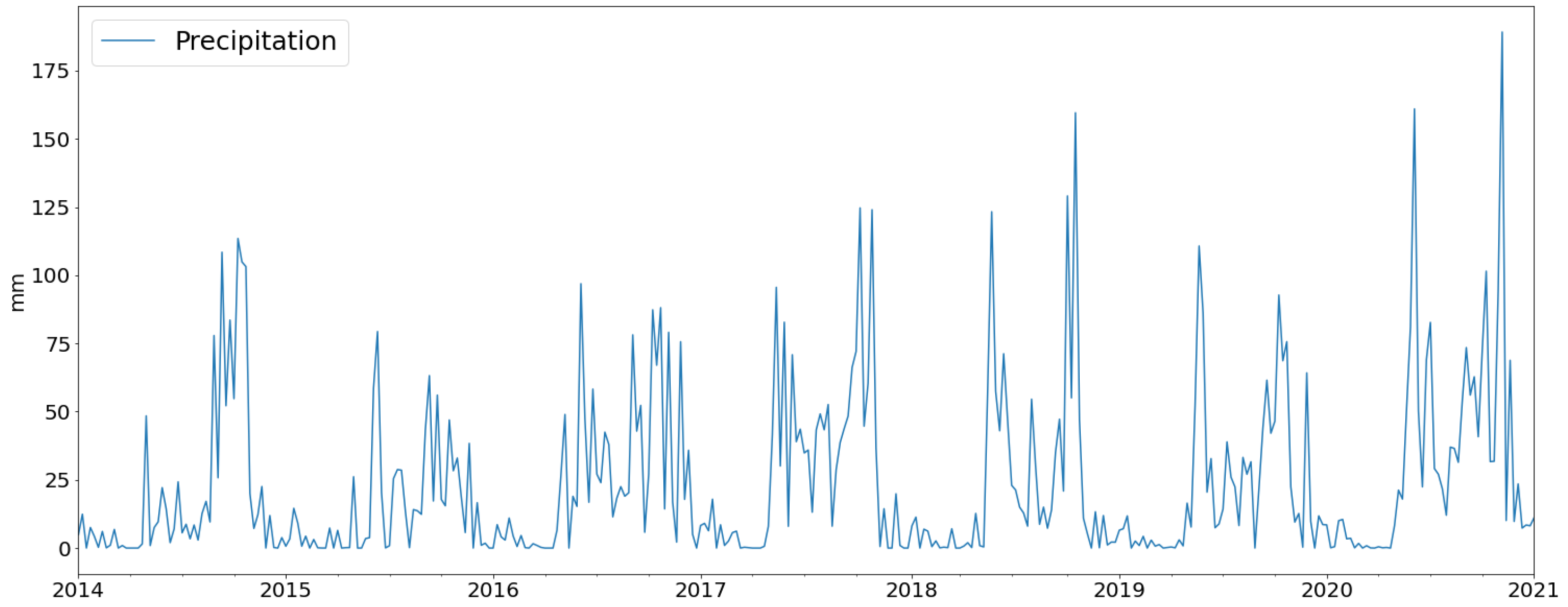
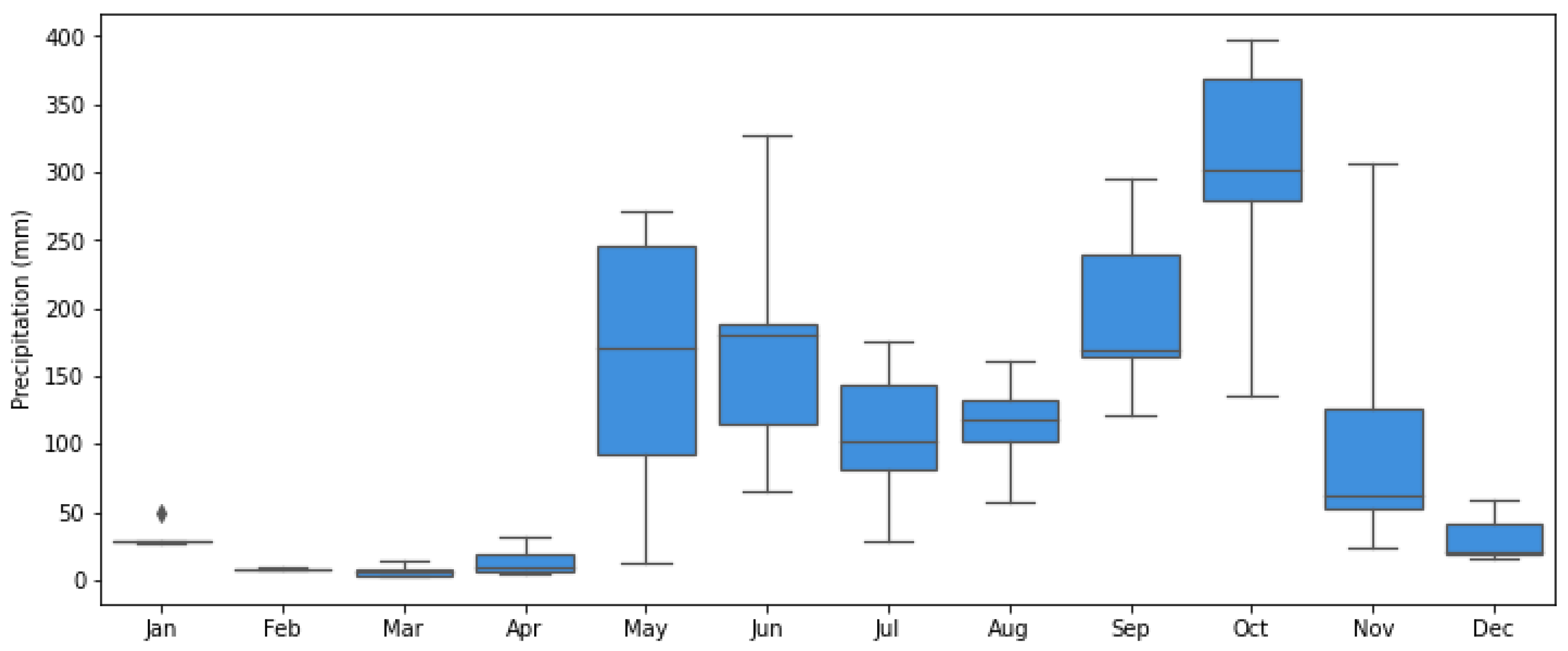
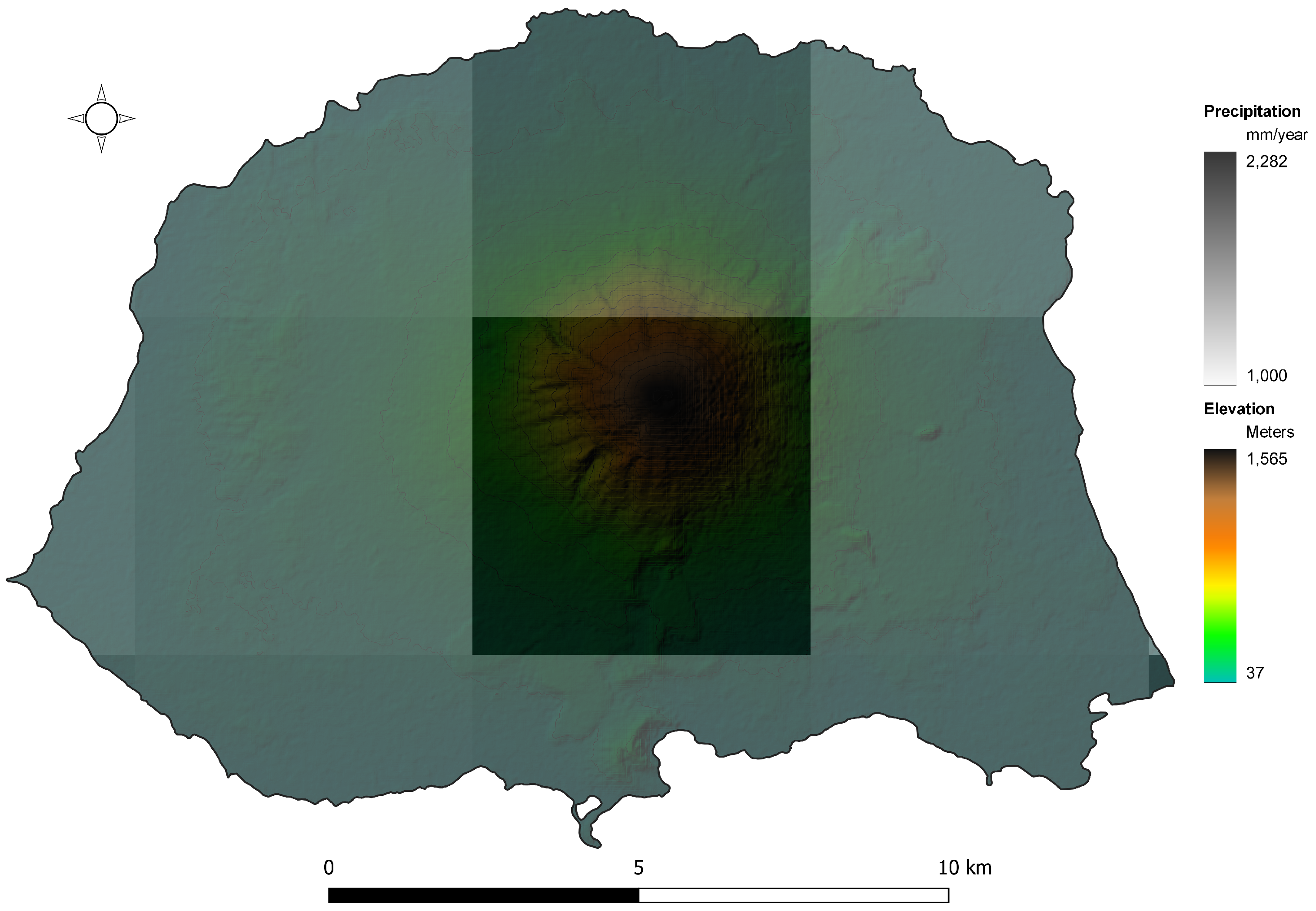
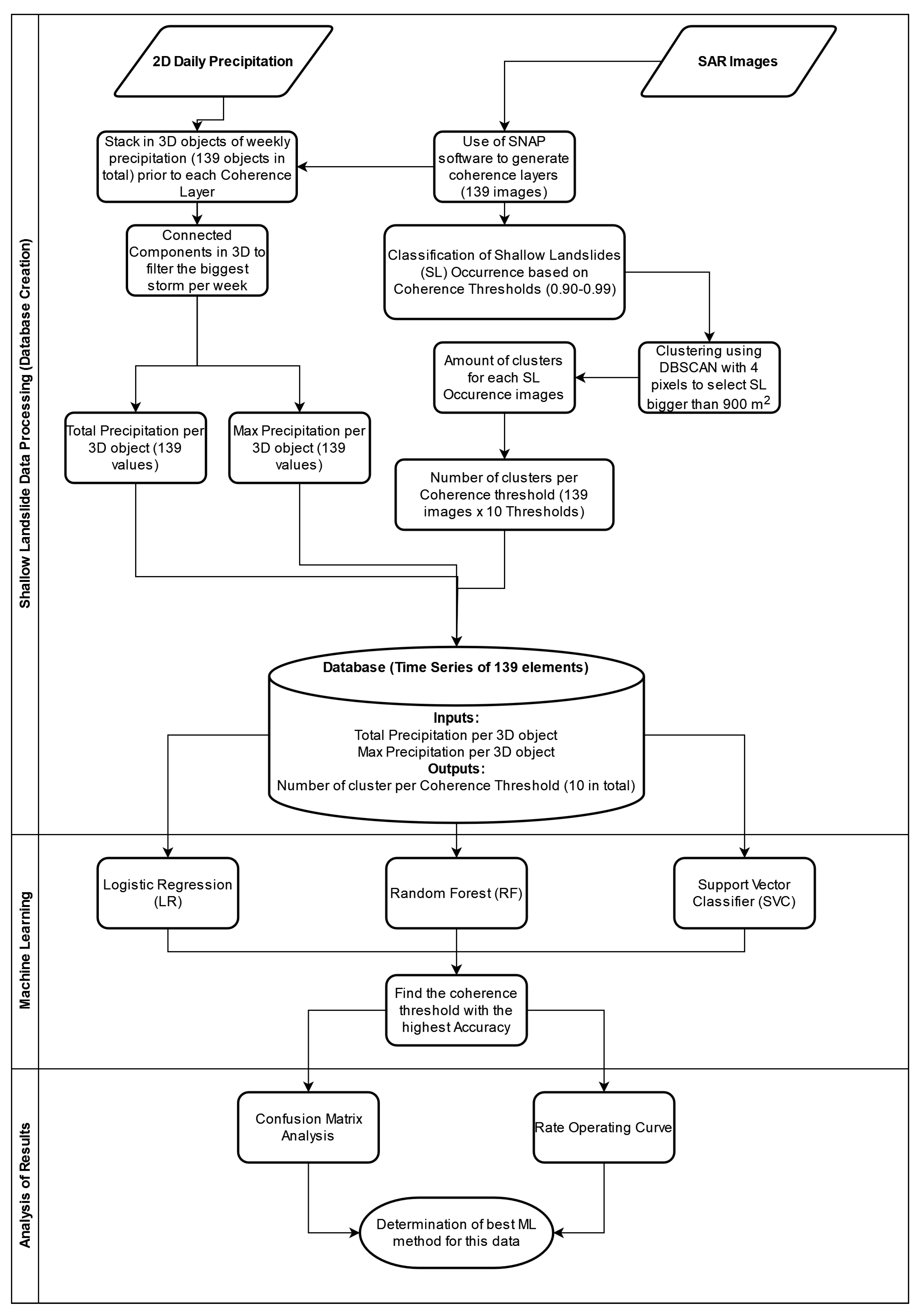
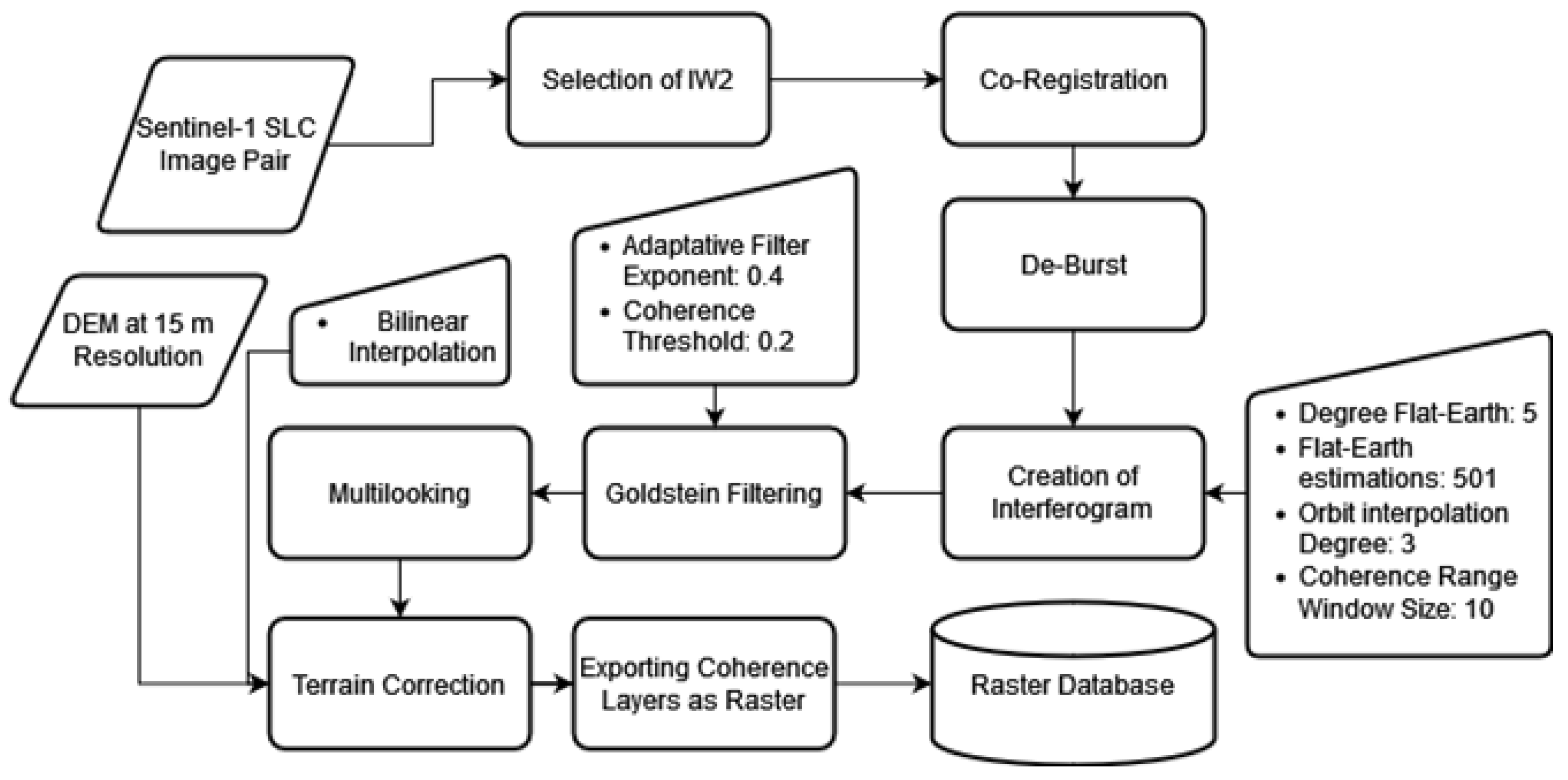
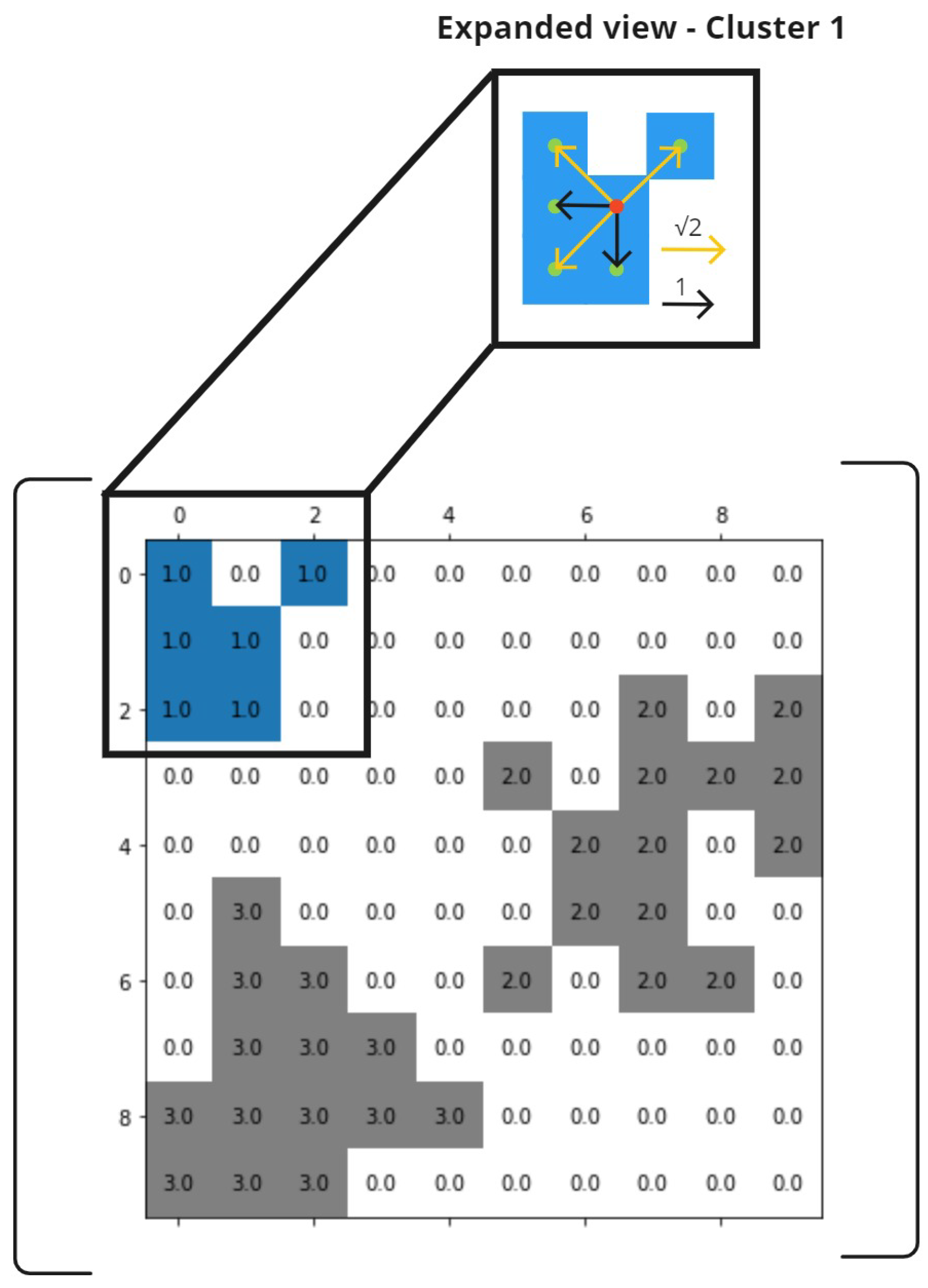
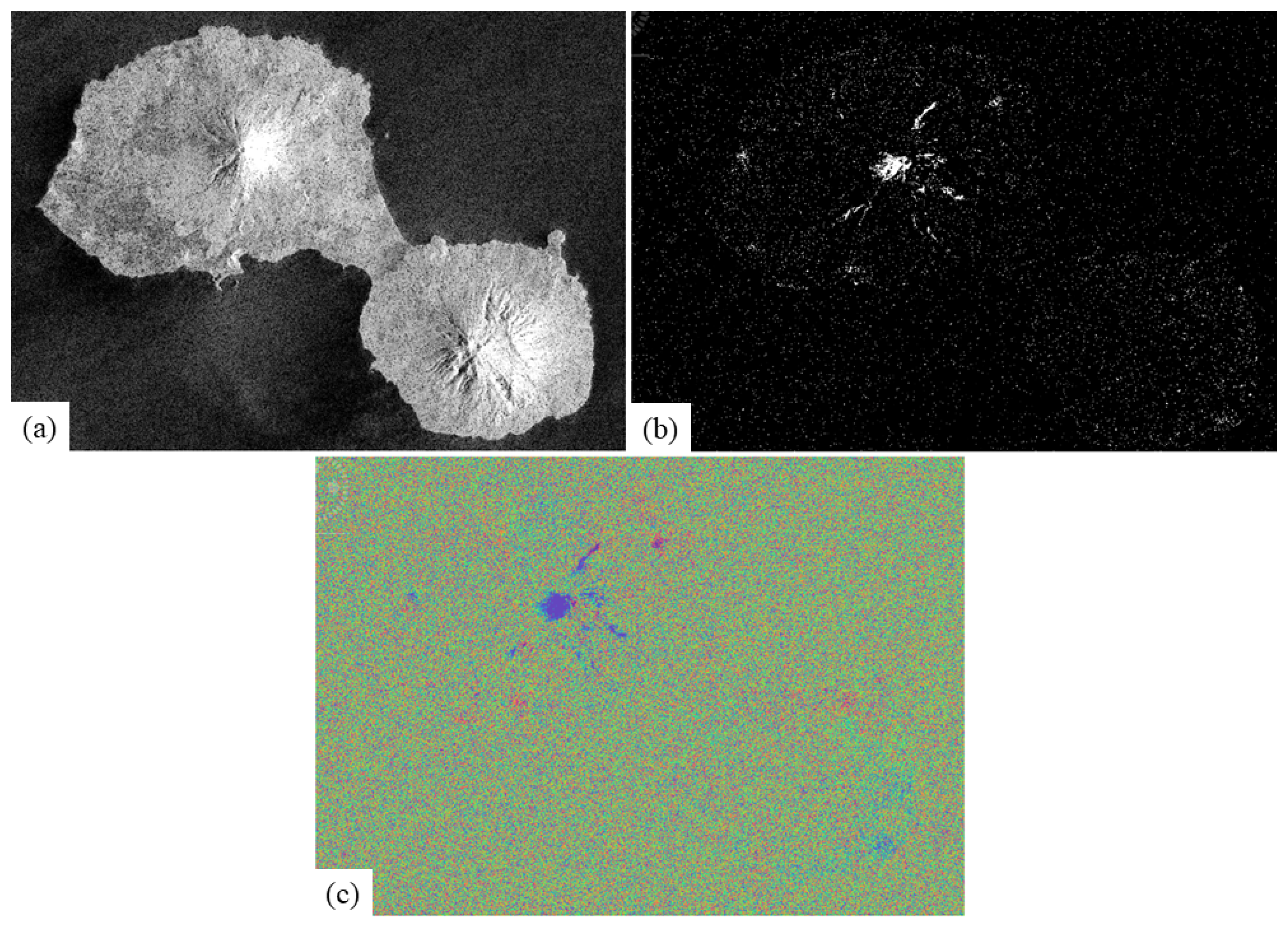
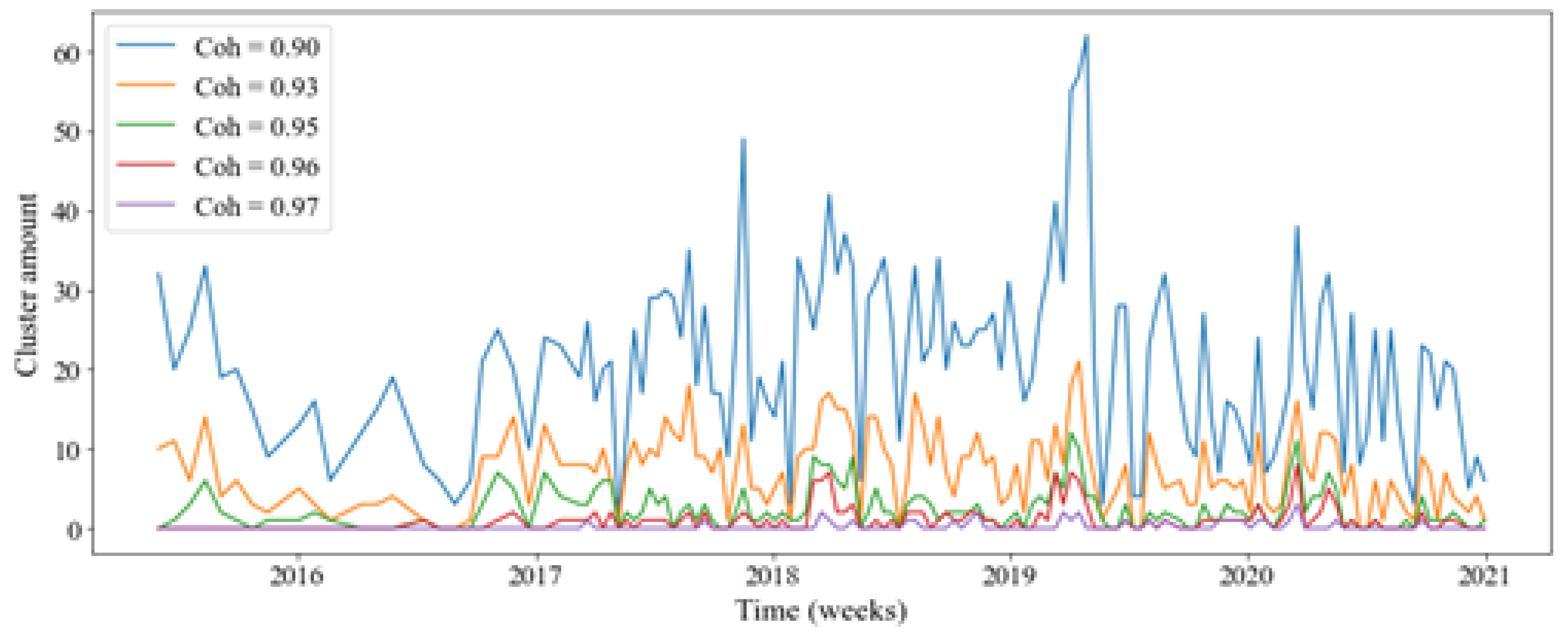
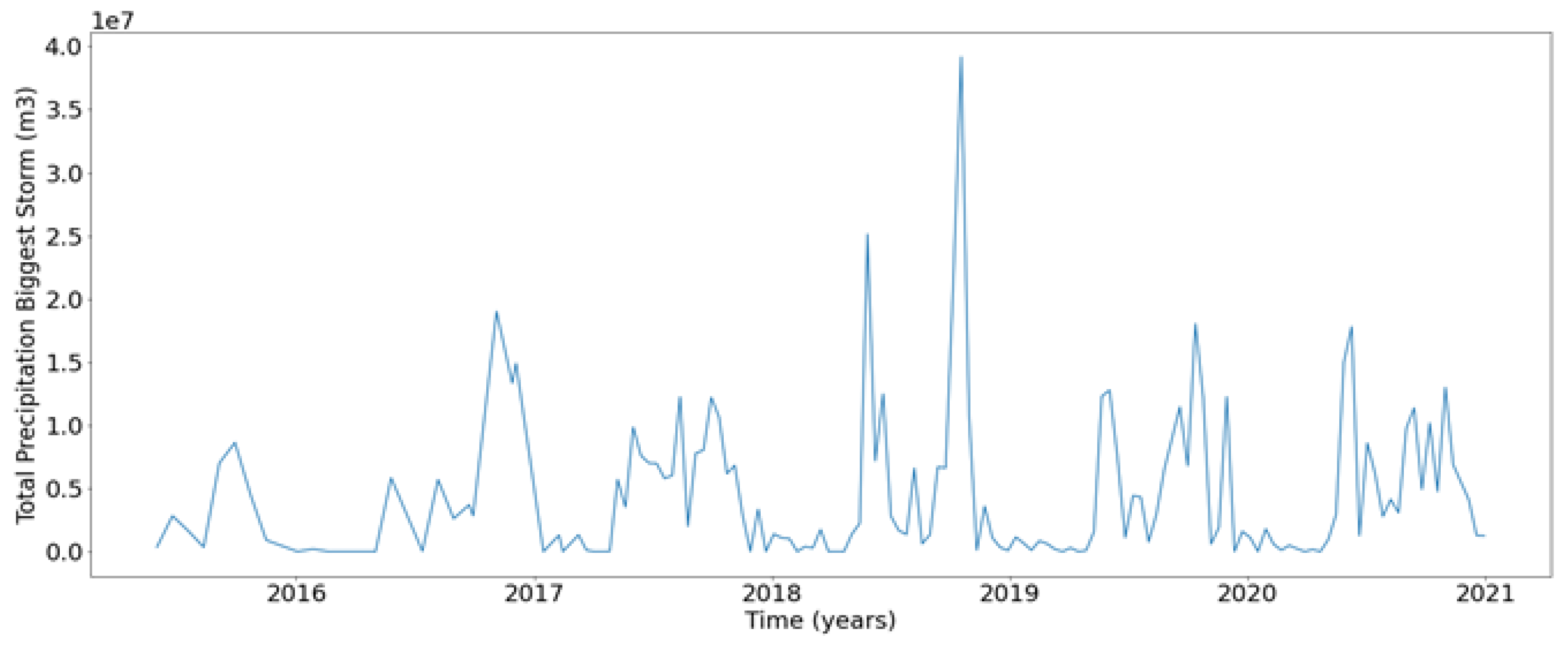

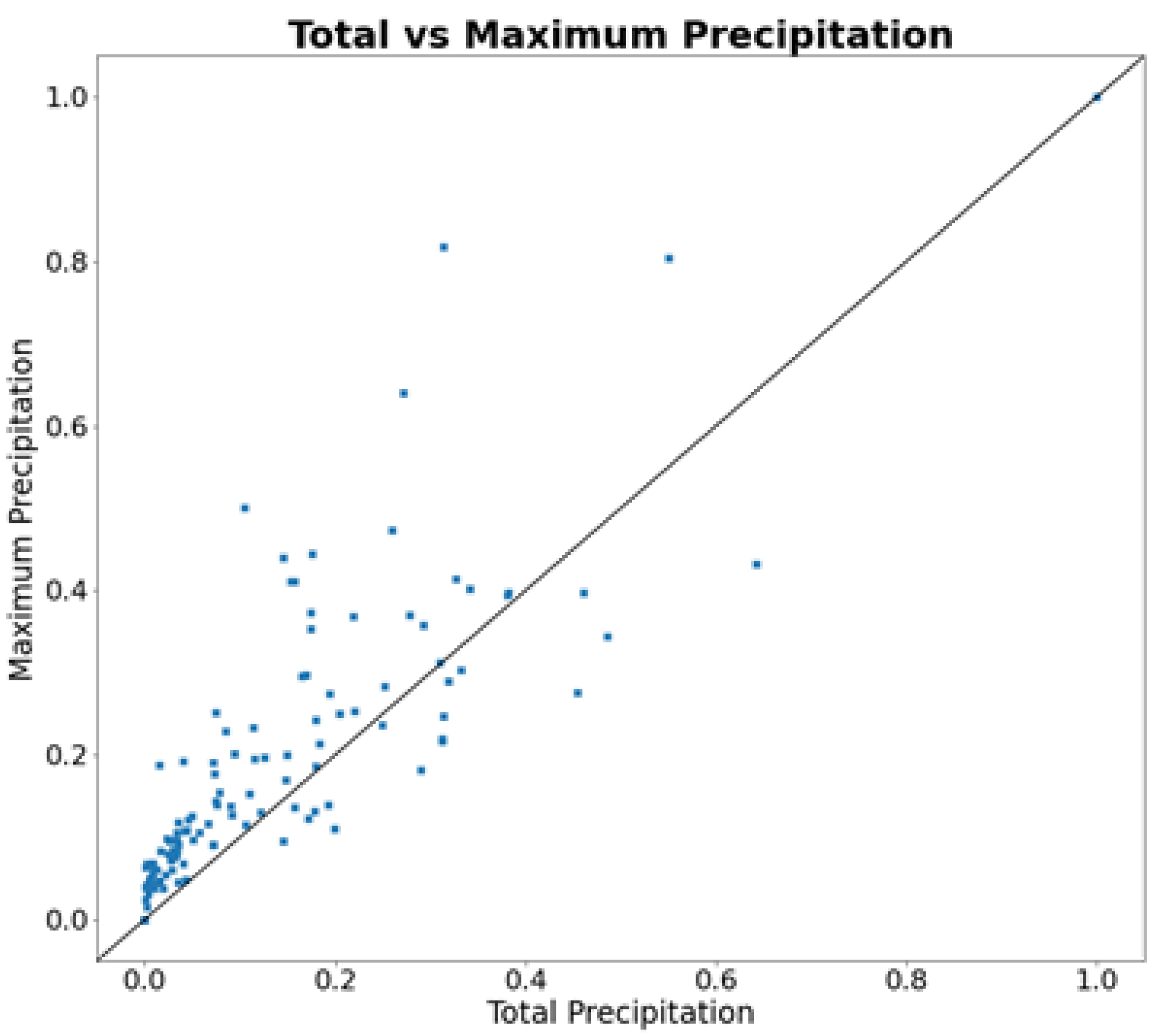
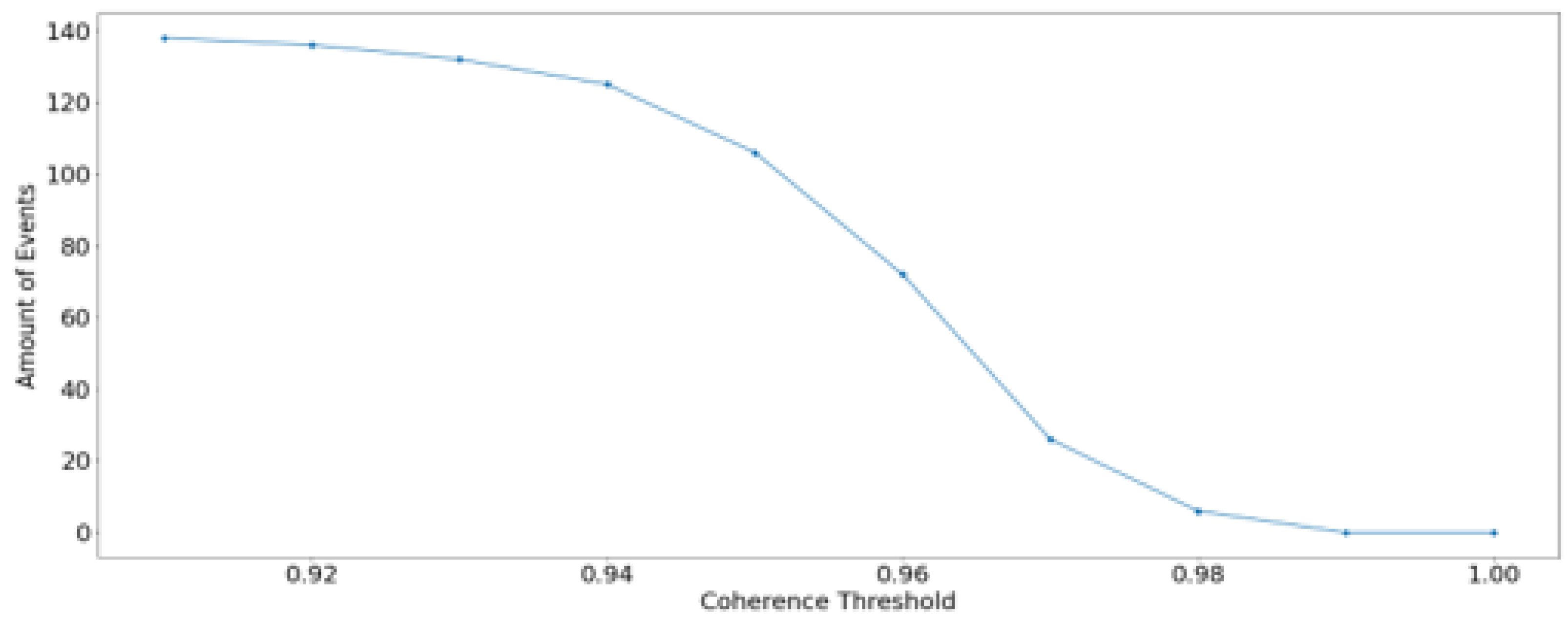
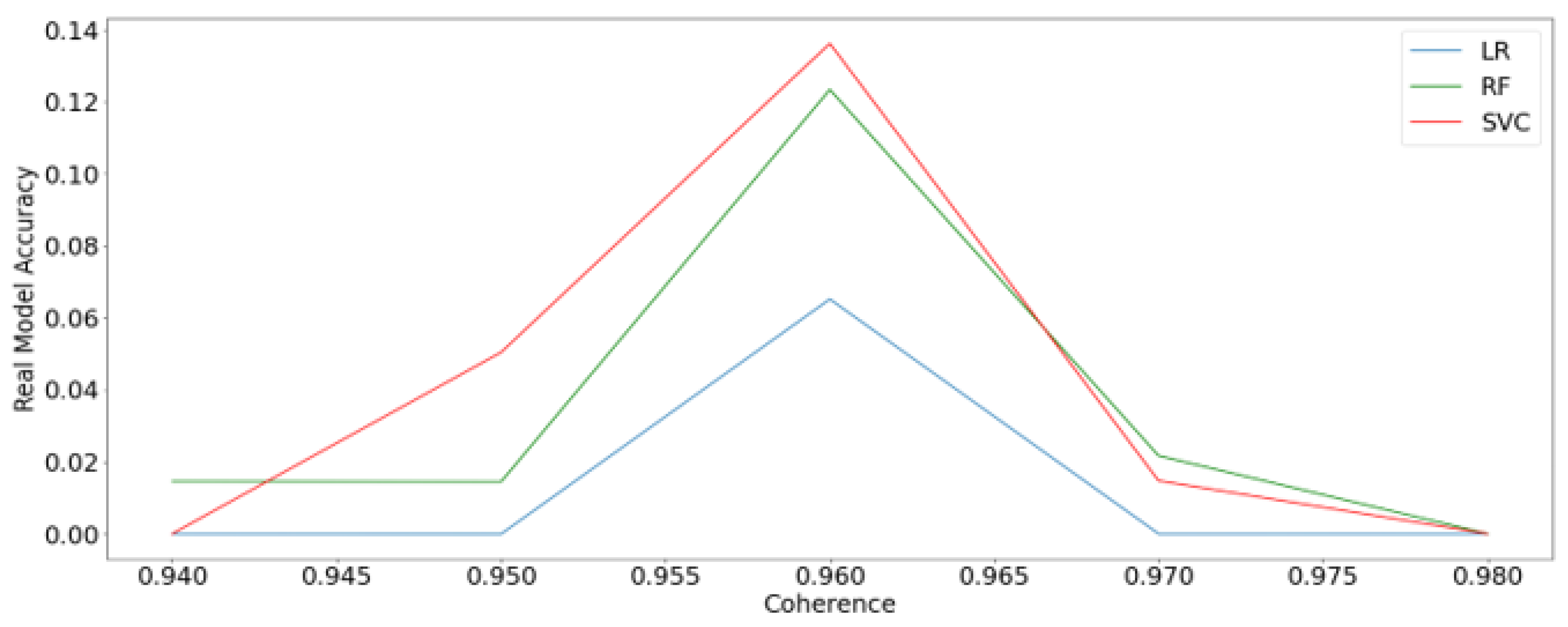
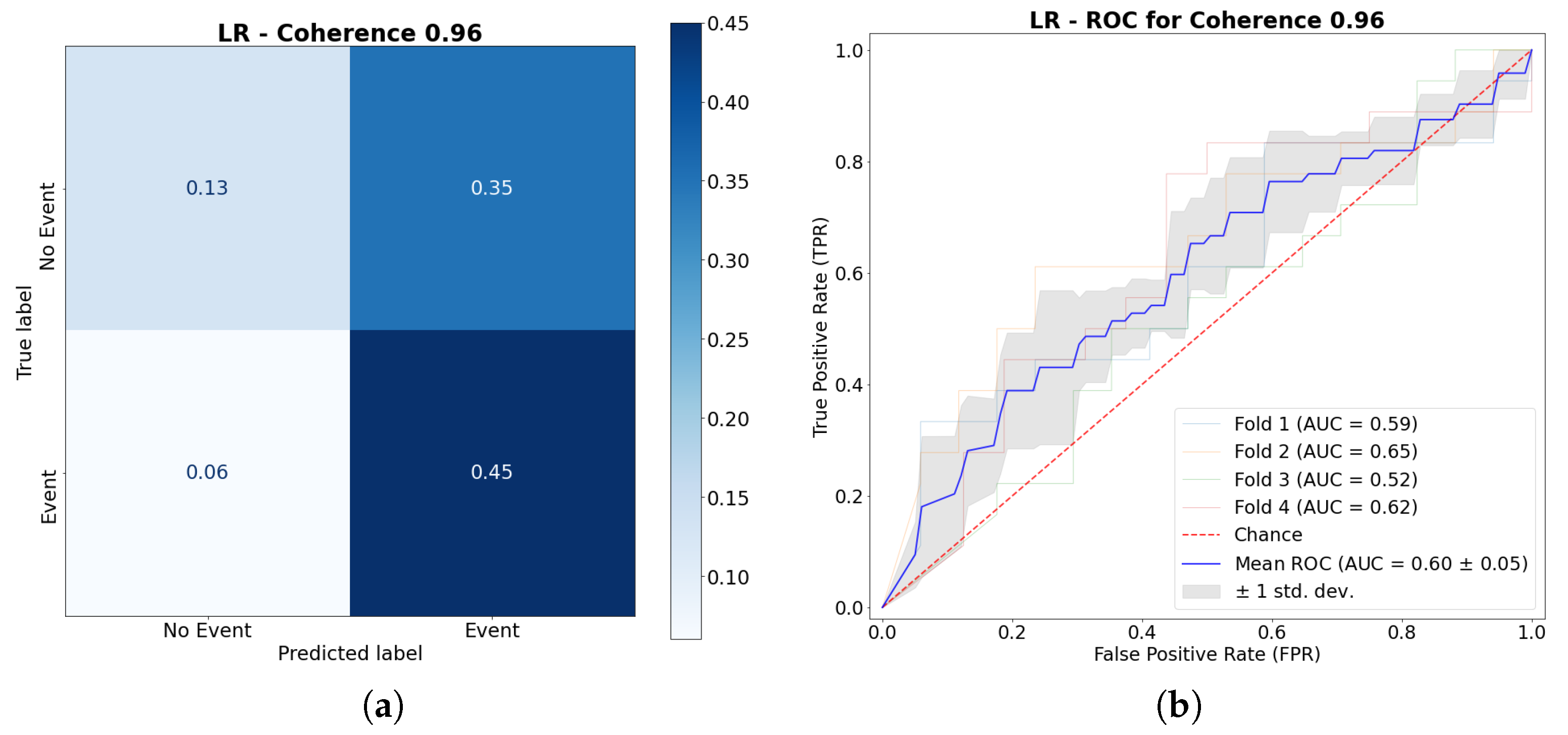
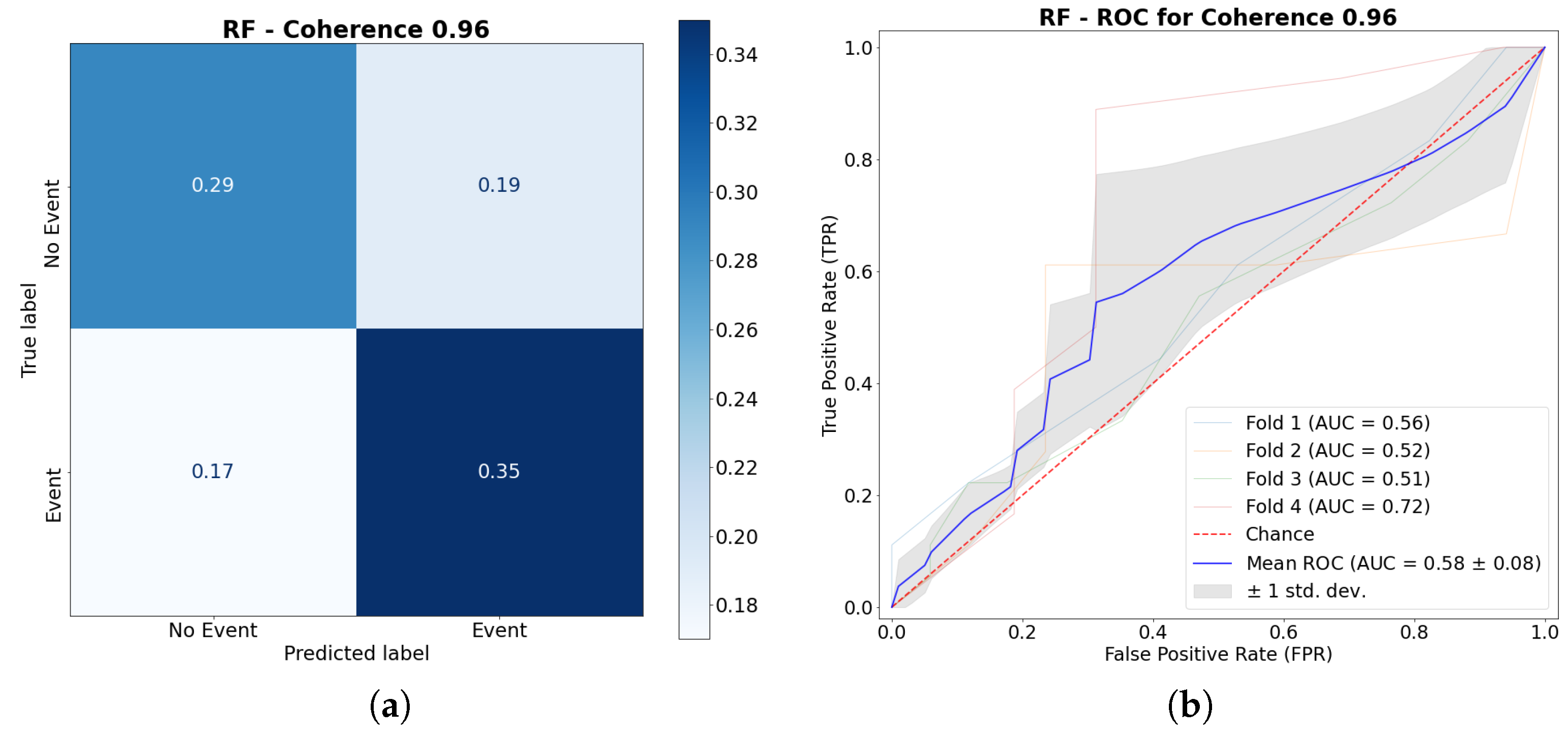
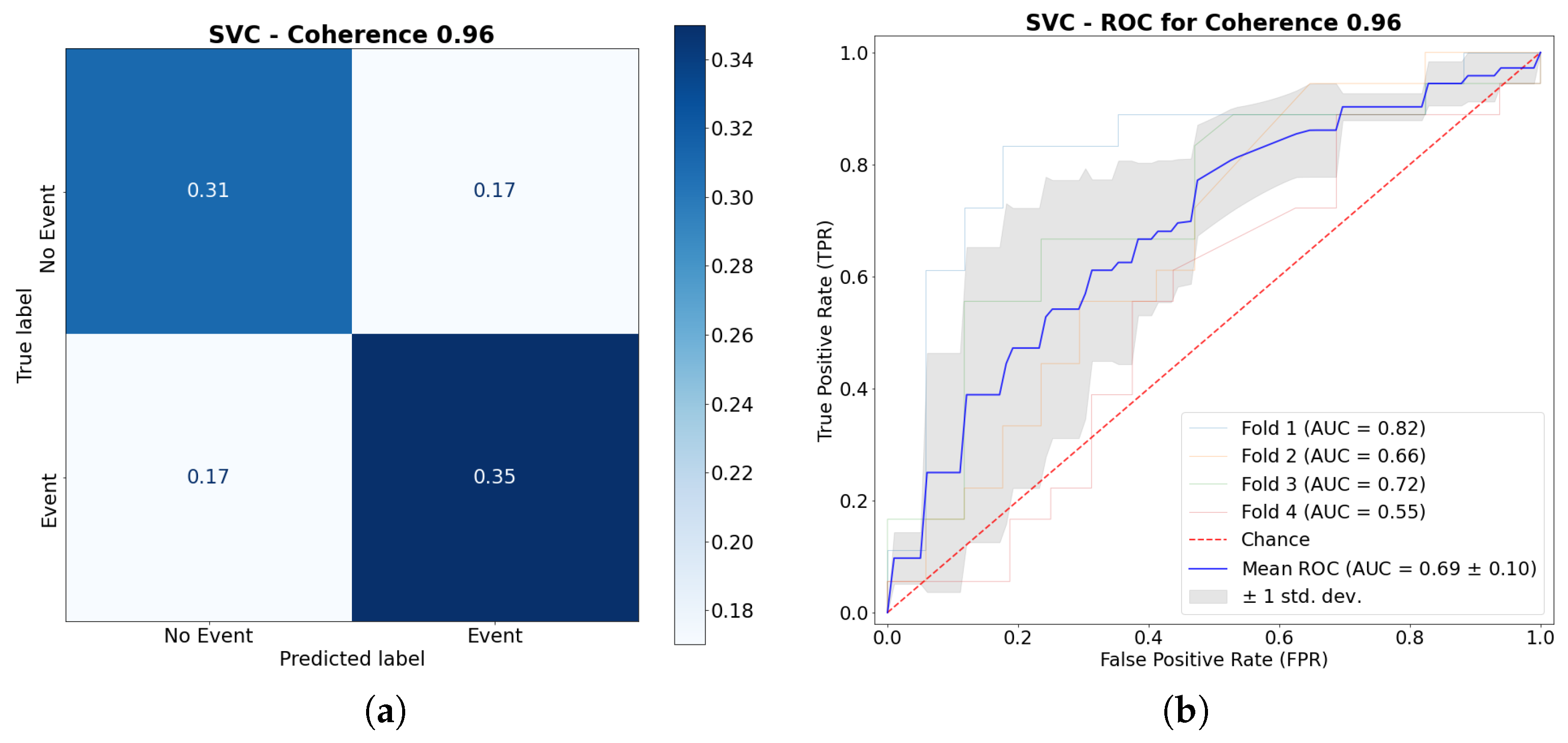
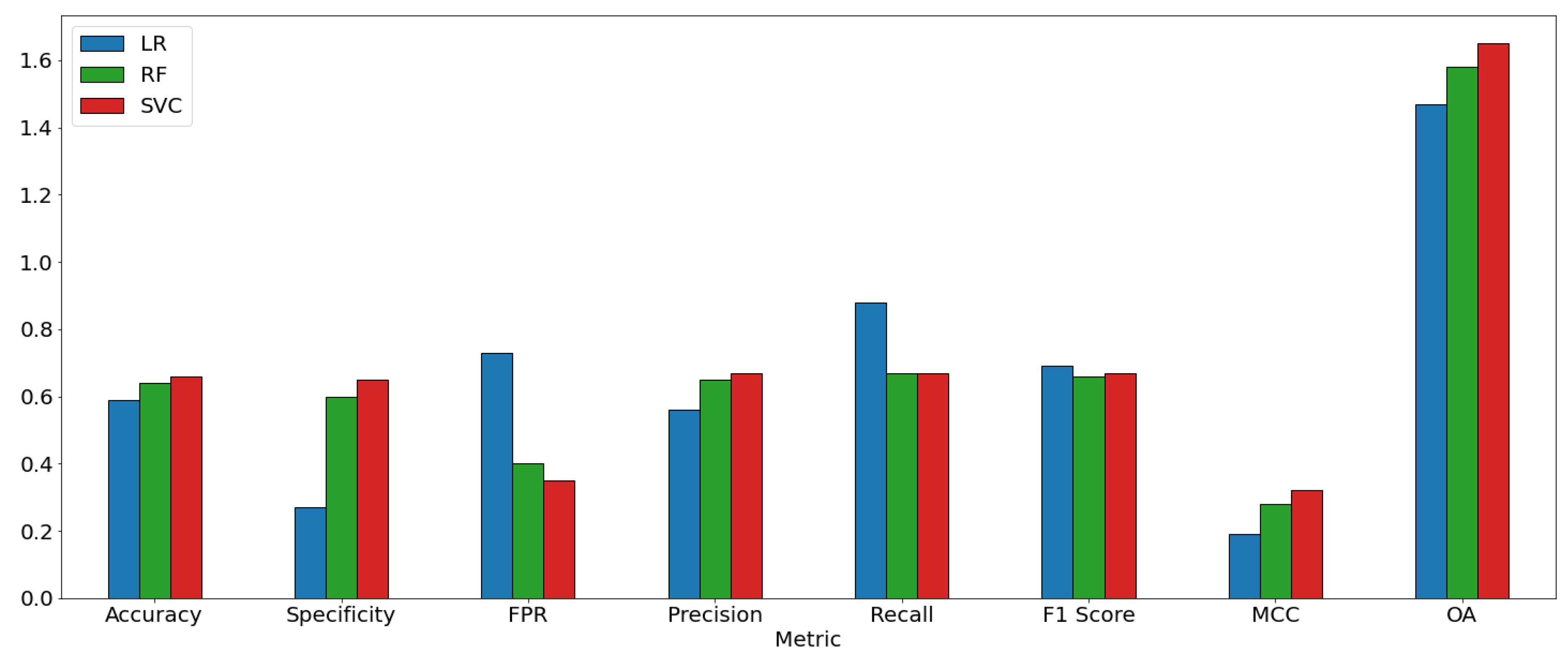
| Logistic Regression (LR) | Random Forest (RF) | Support Vector Classifier (SVC) |
|---|---|---|
| C: 0.5-5 | N estimators: 1-10 | C: 0.1-10 |
| Solver: ’liblinear’, ’lbfgs’ | Criterion: ’gini’ | Kernel: ’sigmoid’,’polynomial’, ’rbf’ |
| Random State : 0-30 000 | Random State : 0-30 000 | Random State : 0-30 000 |
| Indices | Logistic Regression | Random Forest | Support Vector Classifier |
|---|---|---|---|
| TP | 0.45 | 0.35 | 0.35 |
| FP | 0.35 | 0.19 | 0.17 |
| FN | 0.06 | 0.17 | 0.17 |
| TN | 0.13 | 0.29 | 0.31 |
| Accuracy | 0.59 | 0.64 | 0.66 |
| Specificity | 0.27 | 0.60 | 0.65 |
| FPR | 0.73 | 0.40 | 0.35 |
| Precision | 0.56 | 0.65 | 0.67 |
| Recall | 0.88 | 0.67 | 0.67 |
| F1score | 0.69 | 0.66 | 0.67 |
| MCC | 0.19 | 0.28 | 0.32 |
| OA | 1.47 | 1.58 | 1.65 |
Disclaimer/Publisher’s Note: The statements, opinions and data contained in all publications are solely those of the individual author(s) and contributor(s) and not of MDPI and/or the editor(s). MDPI and/or the editor(s) disclaim responsibility for any injury to people or property resulting from any ideas, methods, instructions or products referred to in the content. |
© 2024 by the authors. Licensee MDPI, Basel, Switzerland. This article is an open access article distributed under the terms and conditions of the Creative Commons Attribution (CC BY) license (http://creativecommons.org/licenses/by/4.0/).





